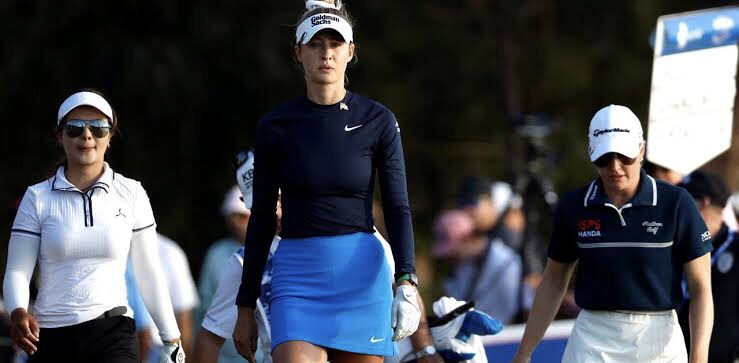Korda’s Historic Season: A Year of Triumph and Slow Play Controversy

The 2024 season has been one of immense significance for American golfer Jessica Korda. With remarkable performances and key milestones, Korda has not only reinforced her place among the elite but also carved a unique chapter in the sport’s history. At the same time, the topic of slow play in professional golf has emerged as a central storyline, with Korda herself becoming unintentionally linked to this ongoing debate.
A Historic Year for Korda
Jessica Korda’s 2024 campaign has been nothing short of sensational, with the golfer making waves across the LPGA Tour. Known for her consistent form, Korda has had one of her best seasons to date, securing multiple victories, breaking personal records, and claiming a coveted spot among the top-ranked players in the world.
Her triumphs have included both domestic and international victories, cementing her legacy as one of the top female golfers of her generation. The highlight of her year came at the prestigious U.S. Women’s Open, where Korda captured her second major title, solidifying her credentials as one of the most well-rounded players on the circuit. The victory was particularly sweet for Korda, who has faced a series of injuries in the past few years. Her resilience and determination in overcoming physical setbacks have been a major storyline of 2024.
In addition to her success in majors, Korda’s performances in other tournaments have shown her versatility. Whether on hard, fast courses or tricky layouts with difficult greens, she has been a model of consistency, rarely faltering in the face of tough competition. She has earned praise not only for her ball striking but also for her mental toughness, a crucial aspect of her development in the game.
Slow Play: A Persistent Issue
While Korda’s season is one of accolades and achievements, the ongoing issue of slow play has also gained significant attention in 2024. Slow play has long been a problem in professional golf, but it reached a new level of scrutiny this year, with multiple players, both male and female, being cited for time violations.
Though Korda herself was never officially penalized for slow play, the issue has nonetheless followed her throughout the season. The debate surrounding slow play tends to focus on the pace at which players walk between shots, the time it takes for players to assess shots, and the overall rhythm of the round. While Korda’s style is generally regarded as thoughtful and deliberate, some critics argue that the overall pace of play in professional golf has slowed down in recent years, and Korda, like many top players, has been caught up in the broader conversation.
In fact, one of the more dramatic slow-play incidents occurred during a high-profile final round at the Golf Channel Classic, where a group including Korda, a popular but slow-playing competitor, and a handful of other players, saw delays in round completion. The incident reignited discussions on how to enforce pace-of-play rules more strictly. Korda, who has always been known for her professionalism, was publicly supportive of the effort to keep pace on the course. In interviews, she emphasized the importance of maintaining a respectful pace, particularly for the fans who come out to watch.
Impact of Slow Play Controversies on the Tour
The slow play narrative has had a significant impact on the broader golf world in 2024, especially in terms of viewership and fan experience. The increasing amount of time it takes for golfers to complete rounds has caused frustration among spectators and broadcasters alike. Rounds that used to take around four hours are now regularly stretching over four-and-a-half, sometimes even longer. As the game becomes more televised and scrutinized, it’s clear that pace-of-play is an issue that is not easily dismissed.
For Korda and others, the controversy surrounding slow play represents a double-edged sword. On one hand, it highlights the pressure and scrutiny that players are under. On the other, it challenges the players to consider their impact on the game as a whole. Korda has stated that while she is deliberate in her decision-making, she does try to keep pace with the expectations of the tour, understanding that golf, while a sport of patience, also relies on maintaining a smooth, timely flow.
Looking Ahead: Korda’s Legacy and the Future of Golf
Jessica Korda’s historic season will undoubtedly be remembered for her exceptional play and her mental and physical fortitude. She has proven herself to be a player who can rise to any challenge, whether it be a high-pressure major or the rigors of a long season. Her success, however, will likely be seen alongside the ongoing slow-play debate, a reminder that as golf evolves, so too must the way it is played and perceived by fans, players, and governing bodies.
As for Korda’s future, she remains a young and dynamic talent, poised to add more victories and accolades to her growing list. Her evolution on and off the course will continue to be a compelling story, with many fans and analysts eager to see how she manages her career and handles the pressures of being one of the top players in the game. For now, though, Korda can bask in the glow of a landmark season—one that will be talked about for years to come as she continues to push the boundaries of what is possible in women’s golf.
In conclusion, while Korda’s performance on the course has been a masterclass in skill, determination, and resilience, the slow play controversy remains an issue that the golf community will need to address in the years to come. As players like Korda continue to redefine the sport, it will be crucial for both the LPGA and PGA to implement effective measures to ensure that the pace of the game reflects the growing demands of modern golf.



